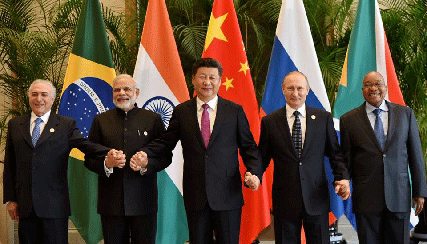Exploring Interdependence
Required Reading
Working Toward Sustainability: Ethical Decision Making in a Technological World, Chapter 4, section on "Exploring Interdependence" (p.75-76).

The required reading from the textbook on page 75-76 is short, and just scratches the surface of the "complex interdependence" theory. For more explanation and examination of the subject, read the following excerpts from the article "Theory of Complex Interdependence: A Comparative Analysis of Realist and Neoliberal Thoughts" by Waheeda Rana included below.
In interdependence there are costly reciprocal effects of transaction among the actors. The policies and actions of one actor have profound impact on the policies and actions of the other actors and vice versa. Interdependence does not only mean peace and cooperation among actors, but a relationship between actors characterized by cooperation, dependence, and interaction in a number of different areas, and conflict as well.
Complex Interdependence is a theory which stresses the complex ways in which as a result of growing ties, the transnational actors become mutually dependent, vulnerable to each other’s actions and sensitive to each other’s needs. Complex Interdependence is defined as: “An economic transnationalist concept that assumes that states are not the only important actors, social welfare issues share center stage with security issues on the global agenda, and cooperation is as dominant a characteristic of international politics as conflict.” (Genest, 1996: 140)
...In the world of ‘Complex Interdependence’, despite the increasing economic cooperation and ecological interdependence, the possibility of international military conflicts cannot be ignored. However, unlike the traditional power politics, in ‘Complex Interdependence’ this may not be the zero-sum game. “The politics of economic and ecological interdependence involve competition even when large net benefits can be expected from cooperation.”(Keohane & Nye, 1977:10)
Robert O Keohane and Joseph S. Nye in their book ‘Power and Interdependence: World Politics in Transition’, described three main characteristics of Complex Interdependence: -
- Multiple Channels: In international politics there are multiple channels connecting the societies, including all the interstate, transgovernmental, and transnational transactions.
- Absence of Hierarchy Among Issues: In the world of Complex interdependence, there is no hierarchy among the issues. The dividing line between domestic and foreign policy becomes blurred and there is no clear agenda in interstate relations. There are multiple issues which are not arranged in a clear or consistent hierarchy. Among other things, “military security does not consistently dominate the agenda.”(Keohane& Nye, 1977:25)
- Minor Role of Military Force: As opposed to the central role that force is given in realist’s world, i.e. an ultimate necessity to guarantee survival, Complex Interdependence assumes that in international relations force is of low salience. When Complex Interdependence prevails, military force could be irrelevant in resolving disagreements on economic issues among members of an alliance, however simultaneously be very important for the alliance’s political and military relations with its rival bloc. According to Keohane and Nye, intense relationships of mutual influence may exist but force is no more considered an appropriate way of achieving other goals such as economic and ecological welfare which are becoming more important, because mostly the effects of military force are very costly and uncertain. (Keohane & Nye, 1977:28)
Excerpts from: Rana, Waheeda. "Theory of Complex Interdependence: A Comparative Analysis of Realist and Neoliberal Thoughts." International Journal of Business and Social Science 6, no. 2 (2015).
Optional Reading
You might find it interesting to read the entire Rana article.